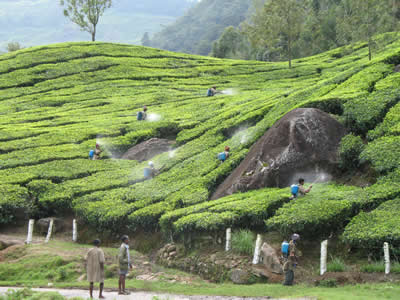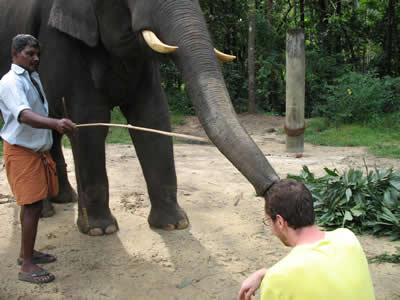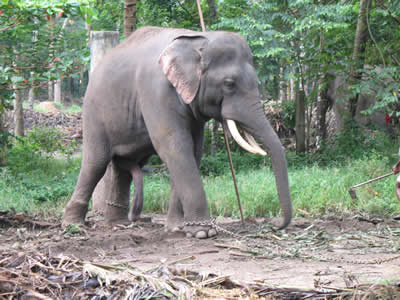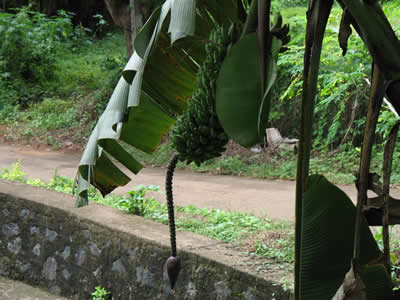Fulbright Phooey! Part 1
|
[Michael Rose is a composer and pianist currently in India with his wife on a Fulbright grant. He is studying at the Kerala Kalamandalam, a performing-arts school in the south, working on both mridangam (the main percussion instrument of South India) and the music of Kerala’s unique dance-drama Kathakali. While not in India, Michael is on faculty at the Brooklyn Conservatory of Music, teaching piano, composition and theory, and running the conservatory’s “New Music Collective” concert series. M.S.] Michael Rose [January 2007.] Hello and welcome to the first installment from India. We’ve been here a month now, for the last week or so in our lovely new house near the school where I’ll be studying. I use the future tense because we’re still waiting for the Fulbright people to get their act together. Until the grant starts, I can’t enroll. It’s now two months and counting since the grant should have begun. More on this soon. For the first few weeks we were based in Cochin, the biggest city in the state of Kerala and tourist-friendly enough to ease the transition to life in India. We stayed in the historic part of town, near the fishing docks and Jewtown. (Most of the Jews moved to Israel a few decades back. One died while we were there, leaving only 13, but the old synagogue’s still standing.)
From there we made several trips, most notably to Munnar, which has to be one of the most beautiful places I’ve ever seen — with its miles of tea plantations, it looks as if someone threw a giant green quilt over the hills. The first couple of mornings in Munnar we were greeted at five a.m. by a neighboring temple’s loudspeakers, which would blast Hindu songs all day. For the last night we stayed in a bizarre anachronism of a hotel, a Raj-style “sporting club” with a small, decaying golf course, two gin bars, one in a men-only room filled with hunting trophies, and the most servile staff imaginable. Once you get out of the hotels, the scenery is spectacular. Along the way we’ve seen some temples and palaces, tour-guide stuff. Things like the Taj Mahal and giant temples are pretty far away, mostly in the north, where we’ll go for a few weeks at the end. Kerala’s tropical with plenty of natural sights, and it’s much calmer and more livable here (from what we’ve heard) than in the north or the big cities. The place is nearly equal parts Hindu, Moslem and Christian and has been under Communist rule for almost the whole time since partition. As far as we can tell, everyone’s getting along with one another just fine, there’s no religious conflict, and it’s hard to see caste in action, though I’m sure it’s there. The Commies did a good job, achieving near-universal literacy, and it’s better off than neighboring Tamil Nadu, where most of the laborers come from. For Keralan workers it’s only worth their time if paid by Dubai standards, where loads of them have emigrated. Still, the women picking tea in Munnar make less than $2 a day, and there are disparities between men and women with respect to jobs, education, where they can sit and what they’re permitted to do. A friend who speaks Malayalam recently heard a woman telling her daughter that she couldn’t play football/soccer. That’s for boys. For girls, sweeping is proper. So, there’s good and there’s bad, and what else is new? The initial adjustment was pretty easy, although Cochin’s catering to tourists meant hard-sells every time we stepped out the hotel door. A bit more culture shock came when we got our house. If not for an English-speaking neighbor, we would have had a very hard time. People are often friendly and helpful, but we’re an unusual sight here. Everyone stares, and the kids in town think it’s the funniest thing in the world to try out an English phrase. Despite the prevalence of “English-medium” schools, only a few can really hold any kind of conversation, and yet everyone seems to have learned the same half dozen questions. I keep meaning to write little signs I can hold up in response, “Michael,” “New York,” “student at the Kalamandalam” and “Yes, Kerala’s very nice.” Really though, the complaints are minor, the only hardships arising from differences in language and maybe food. These amount to nothing compared with the royal screwing Fulbright’s given us.
Down with Fulbright! We were supposed to arrive in August, be fêted in Delhi, eased into Indian life by a facilitator, and begin classes after having been set up with housing, cell phones and (by Indian standards) a pile of money. None of this happened. We haven’t been given a penny, I can’t start classes, and incredible amounts of time and stress have been expended in trying to get answers from Fulbright and, in their absence, trying to plan around them. To top it off, I was led to believe that I’d be able to find a piano or keyboard here so that it would not be worthwhile to bring my keyboard from home. Instead, I haven’t played for over a month and composing’s been minimal. It’s hard not to feel I’m wasting away. Staying home wasn’t an option. We’d given up our apartment and jobs for the year. We’re not alone in this, as hardly any of the “student” class of Fulbrights have come in, and many of the “scholars” are still in limbo. (They’re the ones teaching in Indian universities, meaning that their classes have been waiting half the semester for them to show up.) It’s partly the Indian government’s fault, since what we’re waiting for now is government approval; however, Fulbright gave us no indication that delays were likely, and they’ve been horrible about answering questions. Assuming that the grant comes through, excepting airfare, we won’t be reimbursed for expenses so far. Still, it hasn’t been a total loss. I’ve been taking mridangam lessons. (The mridangam is roughly the South Indian equivalent of the north’s tabla.) I’ve seen loads of concerts, and Miriam’s been tutoring a couple of kids in English. Soon we’ll have a Malayalam tutor, and a keyboard’s on its way. And we are in India.
Animals Aplenty Cows! Everywhere! They wander the streets, along with goats, the occasional snakes and lizards, and the usual, mostly friendly, cats and dogs. A few days back, a Malayali movie was being shot at the nearby river. As far as we could make out, the movie starred six or seven elephants. Walking one of the bridges into town, you have to negotiate huge piles of dung. Pretty much everything about an elephant is huge. For those who lament their lost sense of wonder, make it your business to see an elephant penis. Playing House It’s a strange new thing, having a house. When a month’s rent for a three-bedroom dwelling equals two days’ rent for our apartment back home, why not live it up? We’re actually pretty far from living it up. Our cooking staples — spaghetti and ice cream — are hard to find, and there’s a constant battle with ants. No hot water took some getting used to, and people come up to our windows any time of day to ask us things like “Where is your native place?” or “How much did you pay for your table?” The upside: banana trees, a roof to hang out on, and a town a few minutes away. There’s a man-made, algae-covered stone pool next door, in which women pound laundry into submission and do their hair in the pool’s one clean area. Considering that it’s a near-swamp, the mosquitoes aren’t at all bad. The many geckos help out with that. Did I mention our well?
“D” Is for Deadly Buying a bike the other day, I had to wait for workers to attach a wheel-driven light, mud-flaps advertising the bike shop, and brightly colored pom-poms around the wheel hubs. As I sat there, I noticed a few posters. I had come to Kerala with the idea that English would be the closest thing to a national language, with Kerala claiming the country’s highest literacy rate. However, once outside the bigger cities and tourist centers, one reverts to minimal sentences, one-syllable words and gestures. People are nice about these things, but it does remind one of Japan. At the bike store, a new “D Model” was touted as “Dynamic, Dangerous and Deadly,” while another, an ad for a kid’s “Humpty Dumpty” model, would seem to have the same goal. Our food-container instructions are my favorite: “You can now look forward to lifelong friendship from these airtight containers. Kitchen Rani are absolutely Wide-Mouthed without, any beck, marking it much easier for you to put in the stuff…. But no popping of corns please!”
Odds and an End A few random notes. The papers run dating-wedding ads that almost always mention height, weight, caste and precious little else. Certainly none of New York Magazine-style descriptions like “Sophia Loren looks, loves scuba diving and snooker.” I guess they work. Transportation’s interesting. Drivers are quite insane, ignoring lanes and even the left-side-of-the-road rule, and always with a hand on the horn. A bus ride of any length leaves you half deaf from the honking and covered with so much diesel exhaust that a fingernail to the cheek comes away black. I much prefer the trains, with their steady stream of vendors with everything from magazines to still-hot, deep-fried snacks and coffee served from the samovars they carry around. More soon. Regards to all, Michael. [Continue to Part 2 and Part 3.]
[More Michael Rose, Photo Essay]
[Previous Article:
A Performer's Survey of Bach's Goldberg Variations, Part 1]
[Next Article:
Fulbright Phooey! Part 2]
|




